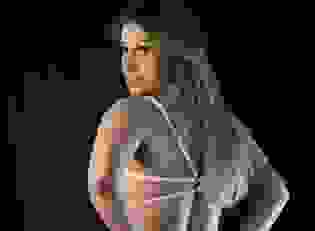- Novels and Novellas
- Varna Ch. 16
Note: You can change font size, font face, and turn on dark mode by clicking the "A" icon tab in the Story Info Box.
You can temporarily switch back to a Classic Literotica® experience during our ongoing public Beta testing. Please consider leaving feedback on issues you experience or suggest improvements.
Click hereThere are victories, and there are decisive victories. The difference - or so the military histories teach us - is often in the pursuit after the battle. I set Durgat's half-orcs loose, with Alissara's elves to support them and guard their flanks.
Behind them went Hurmas and the northern men. Hurmas was wounded, but only slightly, and insisted on continuing to lead his men. After them I sent Yazgash and her people, to protect their rear.
Many of the late arrivals to the field, like Aspar, Kilfa and Sezima's men had marched for hours to join us just in time; they didn't have the legs for it. I let them rest for a short while. Enneiros' elves had had to fight hand to hand in the wood, and had taken a number of casualties. They stayed behind, too.
We looked to our wounded. I had mixed feelings about it, but Sanatha insisted on giving water to the enemy wounded as well.
- "They're thieves, San. Rapists and murderers."
- "There's been very little of that." she said. "Thankfully."
- "Only because we denied them the opportunity. Do you remember what happened in Whydah before we got there? When Yavantay let them loose, and Nathal allowed it?"
- "How do you know these are the same men?"
- "How do you know they're not?" I snorted. "Do you think that the bad mercenaries attacked Aludar from behind, and then sacked the town - but these are 'good' mercenaries?"
Sanatha looked at me oddly. I was angry - at my sister? I should've been happy. I felt Glasha's hand on my arm. She didn't have to say anything; I could tell from the look in her eyes that she was disappointed with me. And so was I. It just took me an extra moment to realize it.
- "I'm sorry, San. That was uncalled for."
- "That's alright." she said.
- "It's not. I apologize."
Sanatha grinned at me. "Then you're forgiven. Tell me what happened here: I thought there would be more dead."
We had lost just over a hundred killed, two thirds of them men. Another hundred were wounded. There were nearly three hundred mercenary dead, and another three hundred prisoners, including the wounded and those who were simply too exhausted to run. That was almost a quarter of the army they'd arrived with.
"The battle went on for so long." she continued. "I thought there would be more ... casualties."
- "Quite a bit of it was pushing and grunting." I said. "Shield against shield. The half-orcs could have done much more damage, but they held their position. It comes down to two things, really: the enemy are mercenaries. They're prepared to kill for plunder - they're not as ready to die for it."
- "You think they didn't fight hard?"
- "Had we wavered, or shown weakness, they would've been energized. Then they would have crushed us, without mercy. But they were tired, and hungry, and when a quick victory eluded them, they weren't willing to risk their lives."
I also believed that their morale was low. The mercenaries had tried several times to lure us into battle, or to get past us so that they could find food. We had denied them both. They now had no choice but to withdraw to lands that had been stripped bare. They didn't have enough boats to cross the river with their guns, and there was nothing left to eat on this side. There had been no easy plunder, and no pay - only hardship, and failure.
Mehana was a great victory, and it was decisive. The mercenaries were beaten, even if they didn't all know it yet.
We would pursue, but carefully. I wanted no headlong rush until we discovered what had happened to the east. If Moksha and the mounted mercenaries had taken Calep, or if they returned and fell on our pursuers, that could change the whole situation.
After an hour's rest, I left Tir Alit's son and his men in charge of our wounded and the mercenary prisoners. With the remainder of our men, we set off after the retreating foe, intending to cover a few leagues before dark.
***
When I asked the fey to contact Peneda, the night before, and to warn him about what was coming, Naevys understood how important this was to me. We both knew that his folk preferred to act independently, and that I had never asked them to 'run errands' before.
That was why Naevys acted the way he saw fit. When his path was blocked by a new mercenary camp (where he hadn't expected to find one), the fey ambushed the sleeping enemy in the middle of the night. Not a full-scale attack, of course; just two dead guards, a volley of arrows, some ear-piercing shrieks, and a few more arrows before the fey disappeared again into the night.
Another two leagues further on, Naevys and his folk found another mercenary camp. This one smelled different, because of the hundreds of horses there. The fey decided to terrorize this camp as well.
They were only able to stampede a few horses, but they certainly threw a scare into the men. They didn't press too hard; three hundred men were a few too many to stir up.
Peneda got his message, an hour before dawn. Naevys was also able to tell him the exact location of the enemy horse camp. Arvo Peneda reacted promptly, and wisely: he immediately sent a message to Dergun and his infantry.
Peneda then did exactly what I'd hoped he would; he interposed his force of 150 riders between the enemy and Calep. When Moksha and the mercenaries rode out, the next morning, they found Peneda blocking their way.
They had twice his numbers, but the majority of their men weren't trained to fight from horseback. They would be lambs for the slaughter in a mounted melee. Moksha tried to go around, and he tried to push forward. Our riders, of course, couldn't risk a battle either, but they did a masterful job of staying between Moksha and Calep, giving ground only very gradually.
While we were fighting at Mehana, Arvo Peneda was slowly retreating eastwards.
By forced marches, never stopping to rest, Dergun's men covered five leagues, and entered the town before the mercenaries could get there.
When Arvo Peneda finally moved his men south, Moksha's men were delighted - until they advanced, and found the walls of Calep bristling with armed men. The gates were shut against them.
They might have guessed that they outnumbered the defenders. But an attack, at this stage, would have been foolish, with Peneda's riders still nearby, and able to take them in the rear.
It must have been a bitter brew for Moksha - or the mercenary captain who was actually in command - to swallow.
They retreated before dark.
***
After all of that, the fey weren't quite done. They found a comfortable wood to rest in, and then decided to move back the way they'd come. There had been far too many mercenaries gathering to the south. Naevys knew that we might need help.
Some of the fleeing mercenaries had the misfortune to run into the fey. Many of them had discarded weapons and armour, in order to run faster.
Normally, the fey prefer to strike from ambush, to hit and run. But unarmed, unarmoured men were simply too tempting.
It wasn't pretty.
***
During the pursuit after Mehana, we discovered something about the mercenaries that we hadn't known. Some of them were professional fighters, well-trained and well equipped. But quite a few were not.
Some had equipment which could only be described as second-hand. Others were simply not in peak condition; we captured men who were too tired to run any further, and too weak to resist. In most of those cases we learned that they had been pulling carts or dragging guns since they'd landed on our shores.
Now I understood a little better. Kurebir couldn't have had much faith in the combat abilities of these men. He'd used them as beasts of burden, while he reserved the better fighters for fighting and skirmishing.
That meant that the early casualties the mercenaries had suffered were unevenly distributed; it was Kurebir's best troops that had been targeted by elven arrows, or ambushed at night by the fey. They absorbed the bulk of his losses during their march south, and especially in the failed attempt to cross over to the western side.
Two days after the battle, we reached the fortified camp on the edge of the river. There were guns everywhere, facing north, east, and now south. Durgat and Hurmas had wisely refrained from advancing too close. Durgat had moved his folk north of the camp, to block a retreat in that direction.
Alissara met Sanatha and me as we approached.
- "There are perhaps 1500 mercenaries there." she said. "There are gunners standing by the cannons, with lit matches. We thought it wiser to keep our distance."
- "I don't blame you. I see horses, though." At least some of Tir Moksha's mounted men had rejoined Kurebir.
- "Can you smell it?' asked Alissara. "They've been eating meat."
Sanatha understood what they meant. "They can't move all of those guns, can they? Not anymore."
- "No." Kurebir had run out of options. He couldn't attack us, and now he couldn't retreat.
Two thirds of the mercenary army at Mehana had failed to return. We'd captured another 300 in the pursuit; no one really knew how many had been killed. The fey weren't counting. Some of the mercenaries, we learned, had simply laid down and given up.
Morale in the enemy camp must have been at rock bottom. I couldn't attack them, but I didn't want to wait days or even weeks as they ate all of their horses. We put our newly arrived forces into position, well out of cannon range.
With Sanatha, I wrote a short note for the mercenary commander, asking for a parley. I gave Osha the honour of delivering it, trusting that the mercenaries would respect a white flag.
We all saw him deliver our message, and then watched as the enemy made him wait, just outside the perimeter of their camp.
Two hours later, Osha returned with an answer. Kurebir agreed to meet me.
***
- "I still don't like it." said Sanatha. Neither did Murzosh.
- "It'll be fine." I said. I didn't fear treachery. Glasha had time-walked; Gedere was no longer in the camp. To make an attempt on my life, Kurebir would have to sacrifice his own - and those of most of the remaining mercenaries.
- "Gedere is on a boat - or a ship." she told me.
Kurebir came out in a wagon pulled by four horses. There was a teamster driving it, and a young servant sitting beside him. In the wagon itself, Kurebir was sitting atop some padding, to cushion his injured hip. Even so, the bumpy, jolty ride on wooden wheels must have been painful for him.
He came 500 yards, just as he'd promised.
I rode over, accompanied only by Murzosh and Osha. Murzosh made sure to keep himself between the driver and the servant and me.
Kurebir remained sitting in the back of the wagon, with one arm over the boards. He had surprisingly dark skin and dark brown hair. His mustache and beard were neatly trimmed. He had two earrings in his left ear; one in the lobe, one at the top of his ear.
Surprisingly, he had a very large nose, and bright blue eyes.
- "Forgive me, Lord, if I do not rise to greet you." he said.
- "Your hip? Is it painful?"
- "Only when I stand. Or sit. Or breathe." He smiled. "Walking is still a bit much for me."
- "I appreciate you agreeing to meet this far from your camp." I said. "Well outside of crossbow range. Do you not trust your own men?"
- "Regrettably, I do not know them all, Lord. It would only take one hothead to ... scupper these negotiations."
I liked the man already. That didn't change my intentions at all - but I enjoyed our conversation more than I had expected to.
"You were very lucky, Lord." he said. "At the battle."
- "At Mehana? How so?" I thought that he would refer to the timely arrival of our reinforcements.
- "My second-in-command was an able man. But he was inspecting pickets the night before, when your invisible fey ambushed him. Then his second-in-command was killed by an elven arrow before he even reached the battlefield. The remaining officers were too junior to dispute Lord Beksha when he claimed the command."
- "That is unfortunate."
- "You might not have won, otherwise." said Kurebir.
- "Perhaps." I said. "But your men didn't have the heart. And their quality ... was quite diminished."
Kurebir nodded. "As you say."
- "Where is Yavantay?" I asked, abruptly changing the subject.
- "In Whydah. He has been there pretty much since we landed."
- "And Gedere?"
- "He disappeared two nights ago. Who is that man?" Kurebir seemed genuinely curious.
- "A poet." I said. "And my brother's pet assassin."
- "Ah ..."
- "Tir Moksha?"
- "In our camp." said Kurebir. "I regret, Lord, that I cannot surrender him to you. That would be ... too base. On my part. I understand that he is a traitor. But I myself will not commit an act of treachery."
I liked him all the more for saying that.
- "Then there is only your own situation to discuss."
- "Mine? How so?"
- "I can't afford to have you go back to Galtin's Port, Kurebir."
For the first time since we'd met, Kurebir looked mildly uneasy.
"I can't have you writing your memoirs, or instructing the next mercenary expedition about what went wrong with this attempt. I don't want the next invasion to profit from your experience."
- "To learn from my mistakes, you mean."
- "You were a formidable opponent." I said. "You surprised me more than once. I know that Durgulel was your time-walker. The point is this: I don't want to face you again, ten or twenty years hence. Nor do I wish to face someone armed with your experience."
Kurebir was trying to decipher what I was telling him.
"To keep it simple, and straightforward: you won't be leaving Varna."
Kurebir had the courage to look me in the eye. He knew very well how Durgulel had died; that was when his hip had been shattered. He also had to have heard about the death of Beksha. This man knew very well that I could kill him from a distance.
"I would hate to have to kill you." I said. "I would much prefer it if you would remain as our guest."
- "As your prisoner, you mean."
- "Far from it. I would like to engage your services. I intend to found a military academy, at Elmina. I would be honoured if you would instruct my friends - and later my children - in strategy and tactics. I would especially like for you to share the learned experience of this campaign."
- "Forgive me, Lord, but ... as far as I know, you have no children."
- "My niece Sirma is our heir. My sister and co-ruler Sanatha needs to learn more about warfare. And my wife Saska is carrying our first child."
Kurebir could do sums. I was going to keep him for twenty years - or for life.
"Let's say fifteen years, to start." I suggested.
- "May I ... may I think on it, Lord?" he said. He certainly couldn't have expected this: I was offering him a choice between death and long-term captivity.
- "Of course. I would expect nothing less. Before you go, though - Kurebir, may I ask - what is your lineage?"
- "I am human, Lord. With ... a small trace of ... well, my great-grandfather was one quarter orc. So I am ... one eighth? One sixteenth?"
- "Is that so? Are you sure?"
- "Quite sure. My grandfather was fond of reciting our lineage, including our descent from the Red Knees. Our earliest ancestor was apparently a great warrior named Umog. He apparently served as a mercenary in Varna, many years ago."
- "She."
- "She?"
- "Umog's name is often linked to Arivan Cunedda, the first Duke - the founder of our line. He made her commander of his Guard."
- "I had no idea." he said.
- "You could see the records yourself, in the archives at Elmina."
Kurebir smiled. "What if we were to say ten years, Lord? Then we could have this conversation again, if you wished to employ me longer."
- "That sounds reasonable."
***
Kurebir let me know that he would to return to Whydah, to organize the surrender there. Before that, though, he informed the troops in his camp that they would surrender on terms the following day.
That night, Tir Moksha and his followers, along with another 150 soldiers, slipped out of the camp, and headed north. Some chose to travel with the traitor Tir, while others thought that they could pass through our lines alone or in small groups. Moksha knew very well what his fate would be if he fell into our hands; many of the mercenaries, for their part, believed that we intended to disarm and then massacre them. They were especially terrified of the fey and the half-orcs.
That, of course, was precisely who was waiting for them, a league north of the encampment. Also there were half of Alissara's elves. Night vision, numbers, and the added element of surprise all told: over half of the fugitives were killed. Tir Moksha paid for his treachery with his life. A handful of men managed to surrender, mostly to the elves. Twenty or thirty managed to escape by turning tail and sprinting back to their camp. They were not pursued.
The remainder went missing. I don't know if any of them were able to successfully evade our fighters, and then find their way home. But in years to come, it was not uncommon for local herders to find bleached bones, or bits of armour or equipment.
Kurebir honoured the first part of our agreement. The remaining mercenaries surrendered their weapons, and were divided into two groups. The sick and wounded (including Kurebir himself) were loaded into boats, and ferried downriver. It took three trips to carry them all to Whydah.
The remainder marched north, along the river. We gave them what food we could spare. Unencumbered by carts and wagons, and with no need to drag cannons, it would only take them a few days to reach the mouth of the river, and the sea.
They left behind not only carts and wagons, but most of their arms, as well as all of their remaining guns, plus a staggering amount of powder.
***
It took several days to ferry most of our army to the western side of the river. I left Dergun in charge on the eastern bank, with Peneda and the horsemen to support him. It was a pleasure to have Tir Tanle by my side once again.
The mercenary garrison of Whydah had not stirred very far from the city. They had had to tighten their belts, but they hadn't dared to push south, looking for food, because of their fear of ambush by the elves. Five hundred men may sound like a large force, but they had no idea how many enemies they faced. It was safer to hold the walls of Whydah than to sally forth and risk losing the town.
Kurebir held up his part of the bargain a second time. Once again, he came well out of the city to meet me.
- "We agree to surrender Whydah back to you as soon as ships can come from Galtin's Port to collect the men."
- "Will they do that?" I knew that coin was King, in that massive city - and the mercenaries were not only desperately short of cash, they were up to their ears in debt.
- "I think so." he said. "But I have a suggestion or two, if you wish to hear them."
- "Go ahead."
- "You could send them home in Varnan ships." said Kurebir.
- "No."
- "It would get them out of your land sooner."
- "No. Our ships would have to come from Portoa. I will not pay captains to help invaders escape. Nor will I risk the chance that the soldiers might overpower our crews and steal their ships. No."
I didn't like Kurebir's second suggestion, either - at first. But in the succeeding days, I thought about it again, and saw some merit in the idea.
He wasn't exactly overjoyed to hear what I wanted, but had to concede that there was considerable common sense - not to mention justice - behind my proposals.
The mercenaries in Whydah - except for the sick and wounded - were evacuated. There were carried across the harbour, largely in Varnan boats, to the eastern side of the river. The camp which Yavantay had set up as a supply base now became the last bit of our territory controlled by the invaders.








